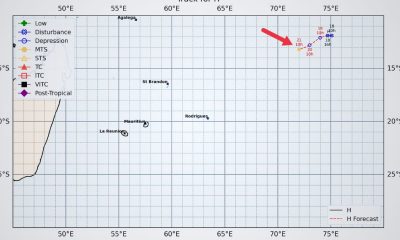News
Mauritius Money Supply Soars to Over Rs 1 Trillion

The Bank of Mauritius (BoM) has released new figures showing a 1.3% increase in the country’s money supply, pushing it past the Rs 1 trillion mark for the first time. The money supply, which reached over Rs 1,021 billion by the end of July 2025, was primarily fuelled by a 4% jump in foreign currency deposits.
This trend indicates that individuals and businesses are increasingly favouring foreign currencies like the dollar and euro to safeguard their assets amidst a weakening rupee and global economic uncertainty.
Key Drivers and Trends
The rise in the money supply, defined as the total value of banknotes, coins, and bank deposits held by the public, is predominantly due to a significant increase in bank deposits.
Mauritians and businesses now hold Rs 963 billion in deposits. While rupee-denominated deposits only saw a modest 0.5% rise, foreign currency deposits have surged, reflecting a lack of confidence in the local currency.
Banknotes and coins in circulation have remained relatively stable, experiencing a slight 0.4% increase to Rs 57.8 billion.
In contrast, funding instruments issued by banks, such as certain bonds, saw a dramatic 62% collapse in a single month.
Sources of Growth
The main source of this monetary expansion is a 6.9% increase in external assets, which include foreign exchange reserves and funds held by banks and the BoM.
Commercial banks have bolstered their foreign currency holdings, while the central bank’s reserves have slightly declined.
Additionally, domestic loans and credits have seen a modest 0.8% increase, including a 2% rise in government financing and a 0.4% increase in credit to households and businesses.
Economic Implications
The growing abundance of liquidity, particularly in foreign currencies, could have a future impact on domestic prices and the exchange rate.
The preference for foreign currency deposits, while a protective measure, also highlights a loss of confidence in the rupee, which remains under pressure against major international currencies.
Source: l’Express











